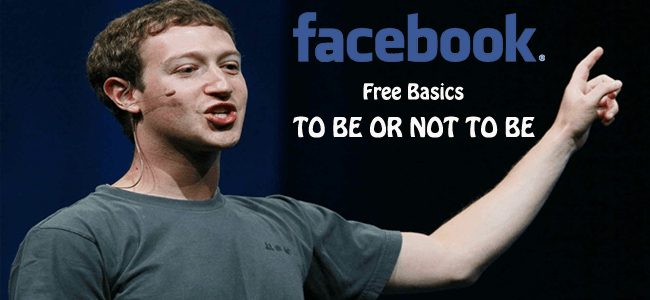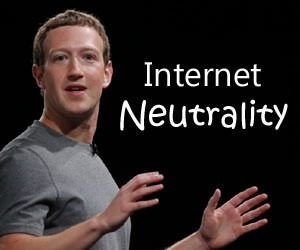The Complete Lowdown of the internet.org or Net Neutrality Camp v/s the Facebook Free Basics Program
Facebook’s Free Basics – Is It Basically Free Of Flaws
2015 – It had really been a troublesome and vociferous year for all the parties – internet users, governing bodies, telecom operators and internet service providers. No, it was not about the crawling internet speed or breakdown of few internet based startup companies. It was all about net neutrality. Such was the rage of debates, arguments, and counter arguments, perhaps the phrase ‘net neutrality’and ‘Free Basics’ would have been uttered more times than that of ‘Good morning’ or ‘Good night’.We are definitely not taking sides through this argument but would rather like to present a rational look of the scenario and show both sides of the coins to our viewers. It is left to our viewer’s discretion to wish which side of the coin they would like to call.

What Is Internet.Org?
Before even presenting the arguments of both the sides, it would be prudent to give a brief back ground information about Free Basics and net neutrality. It was February 2015, almost one year ago, the rage started in India. Internet.org initiated its service in India with RCom as it distribution partner with a primary objective of extending the reach of internet to rural poor people of India. Most importantly, the data charges were free of cost for viewing few selected, specially designed websites that provide information on weather, news, education, jobs, health and social development. The scheme was instantly appreciated and in fact, within its operation of six months, RCom garnered around 1 million subscribers under the internet.org program.Subsequently, in September 2015, internet.org was re-christened as Free Basics and started inviting other developers to join them with certain stipulations that are basically to conform to the design technical specification.
What Is Internet Neutrality?
The voices of net neutrality emerged simultaneously with internet.org. By the by, what is net neutrality? Vishal Mishra, an expert with Columbia University, aptly describes it as the ability of telecom operators and internet service providers to disallow any sort of competitive advantage to any particular application or website. What had started as a lone cry, turned into a nationwide chorus through various forums and societies. It should be admitted that it was due to the immense pressure of the net neutrality forums, that Telecom Regulatory Authority of India (TRAI), the central governing agency controlling the voice and data media, woke up and stayed the operation of Free Basics. The argument of net
neutrality seekers is quite simple –treat all sites as equal and provide fair chance to the small players to take on the giants.
The Fierce Campaigns
No doubt that the campaigns of Facebook for its Free Basics Program have turned aggressive. In the editorial of a national news paper, Mark Zuckerberg, Chairman and CEO of Facebook, has categorically mentioned that the main objective of Free Basics is to provide everybody with the access to development tools and info so that their social and economic uplift can be easily achieved. This argument did not go well with any of the staunch supporters of net neutrality, obvious to the fact that Facebook decides the conditions for enrolling the participating developers and entities in the Free Basics platform.
Arguments And Counter Arguments In The Internet Neutrality Debate
With TRAI inviting suggestions and inputs from the consumers on this issue, the campaigning voices of both the parties turned high decibel. Facebook initiated aggressive campaigns through bill boards, televisions and double page advertisements in print media. On the other hand, the net neutrality seekers took the online route of blogs and presented their version of concerns. Let us present a few salient arguments and counter arguments from both parties and analyze them threadbare.
Objective:
Facebook says that Free Basics has always been a social program or initiative aimed at the growth of poor rural people of developing countries. Indeed a noble thought from a corporate giant. Facebook further adds that it’s a good opportunity for the Indian developers to offer their services and websites free of cost for those who can’t afford internet access. But this very intention has not gone down will the net neutrality seekers and suggests Facebook to provide unconditional access to all the sites without restricting any telecom provider or developer. Facebook has categorically said that it welcomes all developers and telecom operators to join this initiative as partners. Net neutrality supporters are not amused with this clarification and have expressed the reservation of many websites that have conflicting interests and more than that, they out rightly reject the authority over the right of acceptance of partners resting with Facebook. In other words, the end users of Free Basics would be able to visit only the sites that are approved by them.
As a recent development, Facebook has let the world known that it is agreeable to third party inspections and audits for Free Basics approval process to ascertain the reasons behind rejecting a site was for technical reasons and not for any business conflicting issues or interests.This roughly translates into Facebook’s readiness to accept even Google or Twitter on board. (Again it is a million dollar question whether Google would like to reroute its search engine queries through Facebook!) But this still could not pacify the vociferous demands for net neutrality. The experts have suggested that it is better to have Free Basics with data usage caps to restrict access or allow users with unrestricted data usage by viewing ads.
Is it Really Free?
Secondly, Facebook has expressed that it does not expect any revenue through this initiative and they have no immediate plans of advertisements in Free Basics now. Several forums like savetheinternet.in have claimed that Facebook has not categorically expressed its stand on revenue generation from Free Basics after the trial period of operation.But why to confuse present day complications with future predictions, when Facebook has clearly said that Free Basics is never an obligatory service and users are free to get de-listed at any point of time. Remember, in the prevailing conditions, it is only the net neutrality issue that has cropped up. But as much more social reforms occur due to the free connectivity, more complex issues and situations are bound to surface. Having said this, it is not clearly known that how come the under privileged rural Indians, who cannot afford to pay for the data charges as a normal user, can buy a hand held device to surf the sites through Free Basics.
Relinquishing Personal Data
In this digital world, user data comprising of their interests, tastes and thought patterns are gold mine. For this matter, let us go through a practical action. Even to get the news from a participating news websitethrough Free Basics, the data needs to be routed through the Facebook server. And all the potential details pertaining to search engine phrase and geographic location of the user are stored. This very interesting piece of fact has been the strong point of several forums arguing for net neutrality – the ability of Facebook server to understand the needs of viewers not connected anyway with Facebook. Sounds fair enough! But Facebook has vehemently refuted and said that any stored data would be automatically deleted after 90 days. But it is a common knowledge that even 90 minutes is enough to understand the viewer’s needs and popup the relevant ads. Several senior officials of Facebook have categorically assured that Ads will not be posted in the Free Basics version of the website.
Other Countries Take On Facebook Free Basics?
With 36 other nations belonging to the developing world having adapted Free Basics, there ought to be few good points in it. The fact is that every country’s need is different and so are the ideologies. Precisely, for this reason, if Pakistan and Bangladesh have accepted Free Basics, it need not be replicated by India. But without any biased thoughts, how come 36 other countries have accepted Free Basics if it does not have traces of potential in it?
Let Down For Content Developers?
To maintain the low data charges, Facebook clearly stipulates that all the sites are to be skimmed to bare minimum essentials – no more flash or javascript content, VoIP, HD images and videos. While it seems to be a genuine requirement for operators to bear the low cost charges, net neutrality supporters exclaim it to be a clear hindrance to flash and javascript content developers.
How Is Facebook Basics Offered Free?
The mobile partner bears the low cost data charges of Free Basics and hopes for the users to upgrade themselves as full time premium users for full fledged services. And perhaps this is happening and Facebook gladly accepts it and endorses the bridging internet concept. Perhaps the argument of net neutrality seekers has valid points with reference to the bridging internet. They are not interested in getting bridging limited free internet from Free Basics for they wish to attain the full free internet soon. But, it is definitely not known when full free internet can be achieved. Perhaps few years later or never. With very low data rates in India, already all the internet service providers and telecom operators are juggling with the strategies to merely survive and stay put.
The Current Status Of Internet Neutrality V/S Facebook Free Basics OR Free Internet
With both sides vociferously issuing statements, blogs, email flyers, the ball is now in the court of TRAI. In the month of December 2015, TRAI released a consultation paper titled “Differential Pricing for Data Services” and requested the consumers to provide answer for four questions. The crux of the four questions is presented below:
1. Should Telecom Service Providers (TSP) be allowed differential pricing for data usage for accessing different websites, applications or platforms?
2. If it can be allowed, what measures should be adopted to ensure non-discrimination, transparency and fairness for all?
3. Are there any other methods other than differential tariffs to achieve free connectivity?
4. Any other issues that should be considered in the present scenario?
The receipt of comments pertaining to this issue was up to 7th January 2016, and TRAI received total petitions of around 24 lakhs. Presently, all eyes are completely focused on the final outcome of the petition decision. In fact, few reports suggest that TRAI is not happy with the questioner submitted by Facebook through its site, as the replies do not strictly conform to the above mentioned four questions. But as of now, the suspense continues with several local polls revealing contradictory results.
In the present day scenario, internet cannot be confined only to the business and entertainment domain and it is an unassailable fact that the online platform has emerged as a big phenomenon in all spheres of development. Hence, there isn’t any room for second thoughts on the necessity of the online media to augment the social development. But the big question is about the implementation methodologies pertaining to the growth of rural poor people without sacrificing the policy of net neutrality. It is true that North can never meet south, but there ought to be a middle path. Nevertheless, it should be admitted that these campaigns have definitely ignited a thought provoking question – Should poor people be deprived of connectivity? Perhaps it is time for the government and regulating agencies to carve a governing policy to provide connectivity across all the nooks and corners of our country.
For Or against Facebook Basics, what is your take on these issues and are there any out-of-box ideas to solve this crisis? Feel free to drop a comment below.
Contact us today to discuss your requirements.

